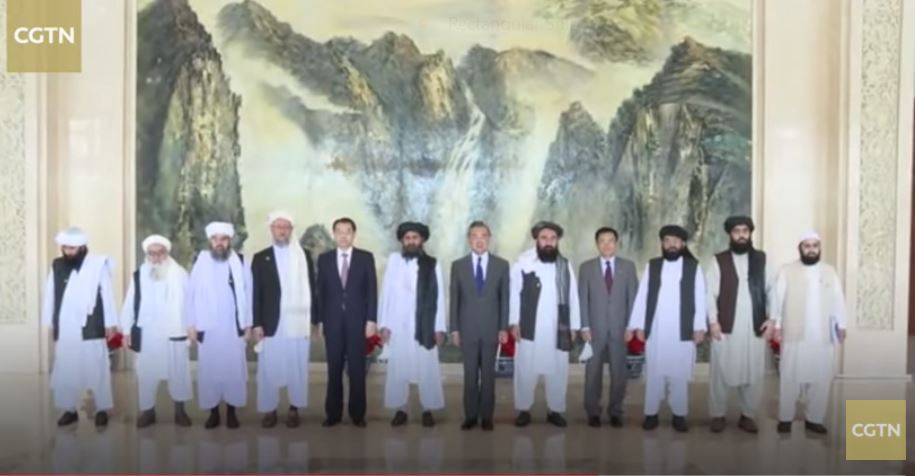The Taliban has said it sees China as a “friend” of Afghanistan and assured Beijing that it would not host Uyghur Islamic militants from the volatile Xinjiang province, which is a major worry for the Chinese government … reports Asian Lite News
China has been eying big scale investments in Afghanistan as the country has the world’s largest unexploited reserves of copper, coal, iron, gas, cobalt, mercury, gold, lithium and thorium, valued at over USD one trillion
When the whole world is in shock over the human rights abuses in Taliban controlled areas in Afghanistan, Communist China offers crucial support to the Taliban. Foreign Minister Wang Yi meets a high-level delegation led by Taliban’s chief negotiator and co-founder Mullah Abdul Ghani Baradar in the northern city of Tianjin on Wednesday.

Taliban spokesman says meeting in Tianjin covered political, economic and security issues as well as the peace process.
The Communist regime has pledged support for the Taliban’s role in Afghanistan’s reconstruction while demanding that it cuts ties with the East Turkestan Islamic Movement – blamed by Beijing for attacks in its Xinjiang region.
This was the first time a senior member of the Taliban had visited China since the capture of several key districts in Badakhshan and Kandahar provinces. Taliban fighters have taken control of around half the country up to its border with the Chinese region of Xinjiang, and US airstrikes continue to support Afghan security forces.
China has been eying big scale investments in Afghanistan as the country has the world’s largest unexploited reserves of copper, coal, iron, gas, cobalt, mercury, gold, lithium and thorium, valued at over USD one trillion.
In 2011, the China National Petroleum Corporation (CNPC) won a USD 400 million bid to drill three oil fields for 25 years, containing roughly 87 million barrels of oil. Chinese firms have also gained rights to mine copper at Mes Aynak in Logar province, according to the Post report.
China’s crackdown in Xinjiang, observers say, has exasperated the resentment among native Uyghur Muslims in Xinjiang. The US, the EU and international human rights organisations have accused Beijing of committing genocide in the province.

The 12th report of the Analytical Support and Sanctions Monitoring Team of the UN last month confirmed the presence of ETIM militants in Afghanistan.
”Politics, economy and issues related to the security of both countries and the current situation of Afghanistan and the peace process were discussed in the meetings,” Taliban spokesperson Mohammad Naeem tweeted.
Baradar, who heads the Taliban’s political office in Qatar and has been the lead negotiator with the US, met Wang in the northern city of Tianjin, the South China Morning Post reported citing sources familiar with the arrangements.
The Taliban has said it sees China as a “friend” of Afghanistan and assured Beijing that it would not host Uyghur Islamic militants from the volatile Xinjiang province, which is a major worry for the Chinese government, according to a media report.
Beijing is concerned that under Taliban rule, Afghanistan will become a hub for the East Turkistan Islamic Movement (ETIM), a separatist outfit aligned to Al-Qaeda which is waging an insurgency in Xinjiang. The resource-rich Xinjiang shares about 80-km-long border with Afghanistan.
Playing down China’s concerns, the Taliban spokesman Suhail Shaheen said they see China as a friend to Afghanistan and is hoping to talk to Beijing about investing in reconstruction work as soon as possible.
Suhail also said the Taliban would no longer allow China’s Uyghur separatist fighters from Xinjiang, some of whom had previously sought refuge in Afghanistan, to enter the country.
The Taliban would also prevent al-Qaeda or any other terrorist group from operating there, he said.
“We have been to China many times and we have good relations with them,” Suhail told Hong Kong-based South China Morning Post, recalling the few meetings hosted by China in the past for Taliban delegations.
“China is a friendly country and we welcome it for reconstruction and developing Afghanistan, he said adding that “If (the Chinese) have investments, of course, we will ensure their safety,” Shaheen added.
Sharply critical of the US move to pull out its troops without stabilising the peace process in Afghanistan, China this week has asked its close ally Pakistan to step up cooperation to contain the security risks in the war-torn country following the withdrawal of the foreign forces.
“(China and Pakistan) need to defend regional peace together. Problems in Afghanistan are practical challenges that China and Pakistan both face,” especially the expansion of both international and regional terrorism, Chinese Foreign Minister Wang Yi said on Tuesday addressing a meeting of the 70th anniversary of diplomatic relations with Pakistan.
The Eastern Turkistan Islamic Movement (ETIM) consists of several hundred members, located primarily in Badakhshan and neighbouring Afghan provinces,” the report submitted to the UN Security Council said.
The report said that large numbers of Al-Qaeda fighters and other foreign extremist elements aligned with the Taliban are located in various parts of Afghanistan.
READ MORE: Thousands displaced in Kandahar amid surge in violence
READ MORE: Anti-Pak sentiment growing among Afghan diaspora
